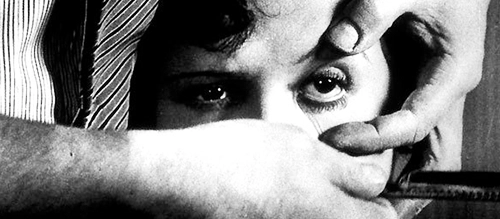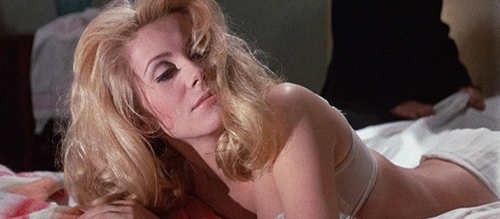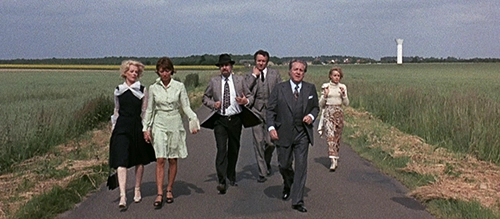Where to Start with Luis Buñuel
If you are a film lover who has just begun to dive into the rich world of international cinema, then odds are that the same recurring names keep popping up. Common among them are the likes of Jean-Luc Godard, Werner Herzog, and Agnès Varda. As you fall deeper down the rabbit hole, the work of Luis Buñuel soon reveals itself.
With a career spanning almost fifty years and with a range of shorts, features, documentaries, and even propaganda filmmaking to his name, the catalogue of Buñuel is a vast one. The director’s work is varied, but there is a clear connection that persists throughout all of his films – experimentation.
Whether it be an early short film with Salvador Dalí, a documentary about the Las Hurdes region of Spain, or a satire of the upper class, Buñuel approached every single subject with a unique vision that set him apart from any filmmaker who came before him or who has come along since.
In a world where the 1950s/60s new waves of international filmmaking are considered the gold standard of cinema the world over, with a handful of revered filmmakers from each country representing their cinematic movements, Buñuel truly stands alone. Having broken down the rich filmography of the great director, here is The Film Magazine’s guide on Where to Start with Luis Buñuel.
1. Un Chien Andalou (1929)

Whether you’ve seen any of Buñuel’s work or not, you have almost certainly seen one of the greatest images ever put to film: a woman’s eye held open, a sharpened blade, cut to a cloud slicing past the moon. It’s an image that originates in Un Chien Andalou, one of the greatest short films ever made and one of Luis Buñuel’s earliest works, a collaboration with legendary surrealist artist Salvador Dalí.
Using dream logic to craft a twenty-minute odyssey of disjointed events with very little tying them all together, the film was revolutionary at the time it was released. Taking all of the early conventions of cinema and throwing them right out the window, Un Chien Andalou is a seminal work of surrealist cinema and a product that is just as shocking now as it was ninety-five years ago.
Introducing the world to the distinctively twisted eye of Buñuel, Un Chien Andalou proves just how ahead of his time the director was, with his work going overlooked and underappreciated for a further thirty years before his films would get the attention and recognition that they deserved.
2. Belle de jour (1967)

The work of Buñuel only earned appreciation from audiences all over the world with his output in the 1960s. Beginning with The Exterminating Angel and featuring some of his most renowned works like Diary of a Chambermaid and The Milky Way, it is 1967’s Belle de Jour that stands out as one of the director’s best, and a terrific starting point for those looking to get lost in the work of the great filmmaker.
Starring one of the French New Wave’s most fabulous actors, Catherine Deneuve, Belle de Jour follows her as a young woman who spends her afternoons as a high-class prostitute while her husband is at work.
Always one to push the boundaries, Buñuel’s portrayal of sex within the film is revolutionary, even for 60s European arthouse flicks. Taking a relaxed, non-judgemental approach to both sex work and kink, Belle de Jour feels fresh even by today’s standards. Using Buñuel’s experimental style, the film takes the excitement of our deepest, darkest desires and juxtaposes it with the monotony of traditional gender roles and polite society, crafting a wonderful story about human nature.
3. The Discreet Charm of the Bourgeoisie (1972)

The Discreet Charm of the Bourgeoisie follows a group of middle/upper-class friends whose attempts to have a meal together are continuously interrupted. Delivered through the lens of an absurdist comedy film, Discreet Charm’s narrative throughline may sound like it would run out of gas or that the joke would stop being funny but it simply never does. Always finding hilariously inventive ways to stop the group from dining together, the film uses the events to tell us everything we need to know about the characters; despite the ridiculous amount of disruptions to their dinner plans, they always plan for another time, never expecting the same result and ultimately exposing their sense of entitlement – they always expect to get what they want.
What makes Buñuel such an excellent director is his understanding of the human condition. Discreet Charm is a tale filled with as much good as it is evil, filled with love and care as well as hypocrisy and selfish desires. Taking these attributes and his deep understanding of human nature, Buñuel decides to poke fun at it, laughing at how ridiculous we all are. Better yet, with The Discreet Charm of the Bourgeoisie, Buñuel pokes fun at the upper class for thinking that money could make them any different from the rest of us.
The sheer amount of laughs throughout The Discreet Charm of the Bourgeoisie makes it a breezy, entertaining watch for first-timers. The fact that it is also a perfect display of a filmmaker at the top of his game is just the cherry on top.
Recommended for you: Where to Start with Pedro Almodóvar
International cinema, specifically of the arthouse variety, is often looked down upon by the uninitiated. Viewing them as pretentious or even boring films that only snobby film fans can enjoy, many are often put off by black-and-white imagery, subtitles, or challenging narratives. A filmmaker like Luis Buñuel takes this argument and blows a hole in it with his beautifully subversive and insanely unique form of storytelling. If you are intimidated by international cinema, simply allow Luis Buñuel to enlighten you.

